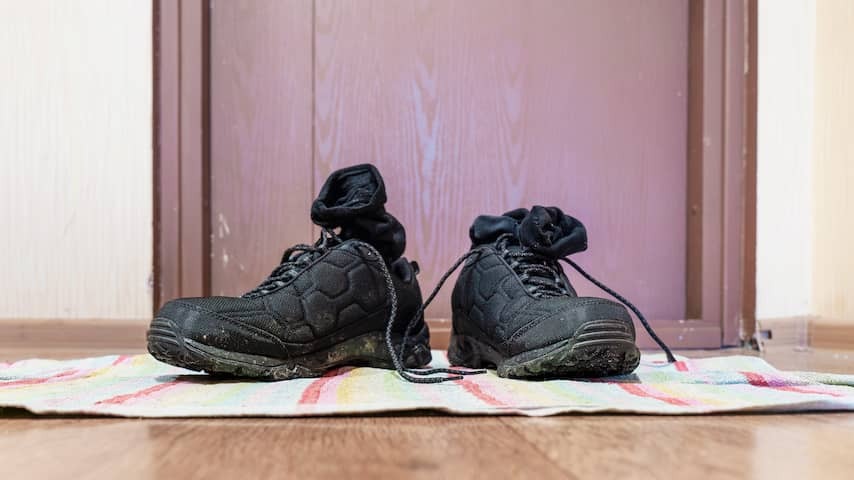
Indoors, you probably often walk around in socks, slippers, or barefoot. But do you also ask your visitors if they want to enter your house without shoes?
Dutch people are not used to immediately taking off their shoes when they visit someone. So if you want that, you have to be direct, says etiquette expert Jan Jaap van Weering. “Of course, in a friendly way, but directive: ‘Shoes off, please, on the mat!’ Then it’s immediately clear.”
That’s not unkind, not impolite, and it prevents awkward social discomfort. Van Weering specializes in good manners and etiquette and doesn’t think the ‘shoes off’ rule is strange.
The University of Arizona investigated how dirty shoes that are worn outside actually are. Participants wore new shoes for ten weeks, after which the shoes were analyzed. The analysis showed that there were an average of 421,000 bacterial germs on the soles. Among them was the intestinal bacterium E. coli, which causes stomach and intestinal problems.
That bacterium is there because your shoes have been in contact with animal or human feces, for example, through public toilets or dog poop in a park. Part of the research also involved cleaning the shoes, with cold water, a cloth, and dish soap. That turned out to be incredibly effective: 99 percent of those bacteria disappeared again.
‘The Dutch are an exception’
Strangely enough, the Dutch often don’t see it as a problem to barge into a house with shoes full of poop, mud, snow, or whatever, says Van Weering. That makes us a bit of an odd one out on the world stage.
“In Russia, things will never be right again if you step on your host’s carpet with your shoes or dirty snow boots,” says Van Weering. “In Japan, they always wear house slippers and even replace them with special toilet slippers when they have to go to the toilet. At Muslims’ homes, the shoes also come off at the threshold. And in a large part of the world, people don’t even wear shoes and their feet are washed before you go inside.”
Shoes full of bacteria don’t have to make you sick at all. The chance of that is actually quite small and also depends on many factors. But taking them off at the threshold does contribute to a cleaner living environment.
Be careful with diabetic feet
Podiatrist Marijn van Olderen thinks that some people like to take off their tight pointed shoes, high heels, or tight cowboy boots for a while. “Letting your feet relax in a natural position is nice. This also prevents excessive sweating or, for example, ingrown toenails.”
But there are exceptions. “People with problem feet due to, for example, diabetes must be very careful with their feet because of their slow wound healing. In your socks or even barefoot, you can easily bump into something or stand on something sharp, resulting in wounds. That really needs to be prevented in these patients.”
And for people with orthopedic footwear, their shoe is a healthcare aid, Van Olderen explains. You don’t just take it off, because then you are no longer mobile. In practice, you have to find a solution together, says the podiatrist. “You don’t walk much when you are in someone’s house. Two hours of drinking coffee on the couch is also possible without orthopedic shoes.”
Respect, decency and politeness
When you enter someone’s home, you enter a zone in which you respect the rules of your host or hostess out of decency, says Van Weering.
“It is an old-fashioned term, but one that we should think about more: politeness. You want to please the other person and respect the rules. And when you receive guests, you also please them. Taking off those shoes is not an unreasonable request. People have a good reason for that,” says the etiquette expert.
“For example, I have a classically furnished house with a high-pile carpet. I also ask it of my guests and I always wear slippers myself. You can also offer guests disposable slippers, as you see in hotels. Don’t come up with your old slippers. Not everyone wants to wear those, and that makes it all complicated again.”
Also don’t put up a sign with “shoes off,” says Van Weering. That is overly prudish, according to him. Also don’t come back to it later during the visit.
As part of the mutual politeness, you can put a few long shoehorns in the hallway, according to the etiquette expert. “This way people can easily put their shoes back on themselves without having to bend over. A pair of house slippers in your bag is also not a bad idea.”